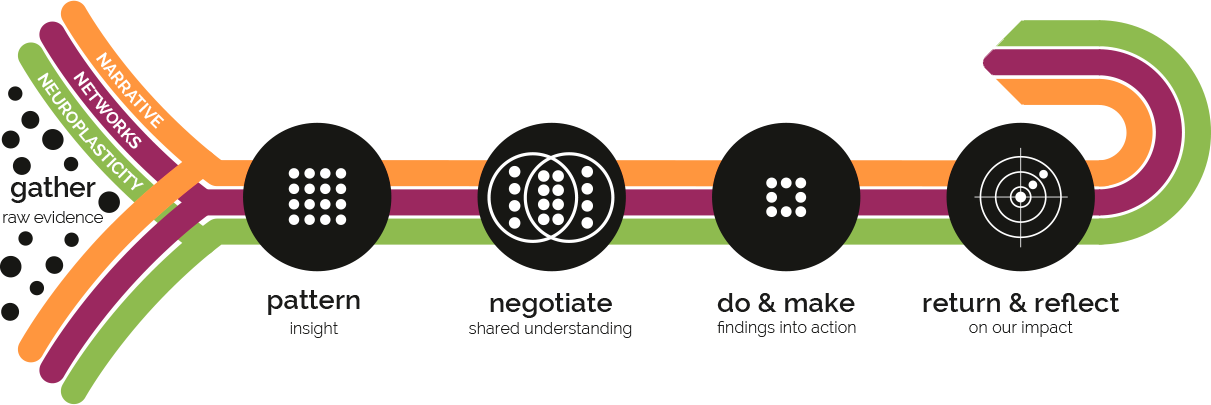Lucidea’s Lens: Knowledge Management Thought Leaders Part 56 – Victoria Ward

Stan Garfield

Victoria Ward has developed and delivered knowledge and change programs in a great variety of settings.
She is regarded internationally as a thought and practice leader in culture, change, engagement, knowledge management, transformation, knowledge networks, communities of practice, and collaborative and storytelling approaches to complex organizational transformation. Victoria provides consulting, research, coaching, facilitation, capacity building, convening, strategic advice, leadership development, and design of participatory processes. She is especially interested in the hidden power of networks, neuroplasticity and the organization, and the role of stories in corporate culture, business ethics, and values.
Victoria set up a radical new consultancy specializing in knowledge, narrative, and transformation. The founding essay for Sparknow described it as a ‘collaborative enterprise designing spaces for knowledge.” She now thinks that she would reverse that to ”a knowledge enterprise designing spaces for collaboration.” Victoria still has a thirst to inquire into the forward edges of change through themes that generally cycle around knowledge management, narrative, tech-enabled transformation, the future of work, and collaboration in the workplace.
Rewiring the organization: Neuroplasticity, Narratives and Networks
Sparknow has shaped a method to gather raw evidence; pattern insight; negotiate shared understanding and commitment; do and make relevant artifacts and experiences that translate findings into action; and return and reflect on the impact of the work and what might be needed next. More and more we are tightening the connections between this method and current research into the brain, neuroscience and cognitive functions, networks, and narratives.
Victoria Ward on Storytelling and Collaborative Workspaces | LinkedIn – interview by Ana Neves
Q: How has knowledge management evolved since your days as Chief Knowledge Officer at NatWest, back in the 90s?
A: I don’t do a great deal of knowledge management nowadays in a direct way, so this isn’t a very well-informed answer.
In some ways, I see no evolution – today’s arguments about information management versus knowledge management, where it lives, what influence it has, echo back down to the very first arguments I was part of in 1996 and 1997. In others, I see a renaissance and a new validity for the principles and practices of knowledge working in the years to come.
The new Chartership is an evolution. Knowledge management is moving around and aligning with digital workplace, learning, collaboration, so is shapeshifting to form alliances.
The emergence of the social organization is another evolution. The emergence of big data sets which invite new kinds of skills in discernment and pattern recognition. Being a human bridge builder between people and data, hosting the spaces in which new knowledge and insight are produced, was always how I conceived of knowledge management, and I think that’s coming into focus as more relevant than ever as a networked stabilizing system within and between organizations. I’m optimistic.
Since leaving NatWest you have set up your own practice and you made storytelling a distinctive tool in your approach to KM. What is it about storytelling that makes it so effective?
I fell into storytelling early, seeing stories and storytelling as the most powerful small units and local spaces for sense-making and the exchange and development of knowledge and insight. At heart, what has always interested me about storytelling is the way it redistributed power and authority, creates local peer to peer trust and relationship, moves knowledge and insight sideways and redistributes power and agency. In one word, witnessing.
Storytelling creates witnessing systems – both the telling and the listening – and reinvents the space between people.
Q: What makes communities of practice so special?
A: Essentially, it’s about nonhierarchical ownership and home, belonging, being part of something bigger than you, more important than ever as organizations fracture and boundaries are porous and confusing.
Q: How does your experience in knowledge management influence the way you look to create collaborative workspaces?
Knowledge management makes you alert to the invisible forcefield that is playing out between individuals and institutions, tacit and explicit.
A storied approach to knowledge management makes room for complex emotions, and a tug and pull of fluid sense-making in which all data counts towards understanding and decision-making. Knowing this means that I design, host and curate collaborative spaces with many layers of production of knowledge and skills in mind.
If I were to pick a single thing though, it would be curation – the curation of a collaborative experience in a way that consolidates it and helps it travel forward in multiple ways. See the answer on storytelling above for more.

Stan Garfield
Enjoy Stan’s blog posts offering advice and insights drawn from many years as a KM practitioner. You may also want to download a free copy of his latest book for Lucidea Press: Knowledge Nuggets: 100 KM Infographics. Learn about Lucidea’s Presto, SydneyEnterprise, and GeniePlus software with unrivaled KM capabilities that enable successful knowledge curation and sharing.
Never miss another post. Subscribe today!
Similar Posts
Lucidea’s Lens: Knowledge Management Thought Leaders Part 79 – David Garvin
KM expert David Garvin was a proponent of organizational learning to counter unpredictability in market forces and technology advances.
Lucidea’s Lens: Knowledge Management Thought Leaders Part 78 – Carl Frappaolo
KM expert Carl Frappaolo was the creator of Delphi’s Knowledge Management Methodology (KM2)
Lucidea’s Lens: Knowledge Management Thought Leaders Part 77 – Leif Edvinsson
Leif Edvinsson, Professor Emeritus at Lund University in Sweden, specializes in Intellectual Capital Management of Enterprises, Cities, and Nations
Lucidea’s Lens: Knowledge Management Thought Leaders Part 76 – Seth Earley
Seth Earley works in cognitive computing, knowledge engineering, data management systems, taxonomy, ontology, and metadata governance strategies.

Leave a Comment
Comments are reviewed and must adhere to our comments policy.
0 Comments